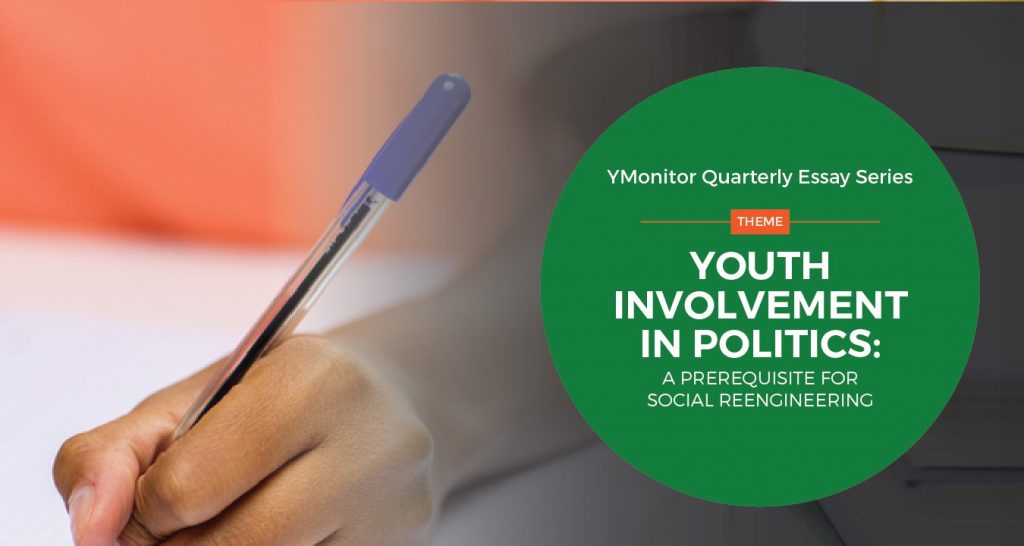by Opeyemi Adeojo
The issue of youth involvement in politics has continued to generate a lot of interest all over the globe mainly because it pertains to the accelerating drive to further promote democracy and also the achievement of sustainable development. In Africa, the economic development of the region and the political future revolves around proper engagement of the youths in decision making and governmental processes that affect their life.
According to the United Nation, there are over 1.8 billion youths all around the world in which they are majority in many countries. A large number of African countries have a high percentage of youths in their population structure. Nigeria for instance has a youthful population with about 60% of the population falling within the youthful age. The implication of this is that, if effectively channeled, the population structure will surely bring about a complete state of demographic dividend.
The general perception is that youths are inexperience and not matured enough to be trusted with the affairs of the state. Consequently, the youths in many countries have been left out in major decision making that involves policies and politics. In some countries, the sidelining of the youths in governance is legalized through age restriction to contest for political offices. In the real sense of things, youths are the most vulnerable to social discomfort and at the other end they are vibrant and energetic when motivated and sufficiently guided for societal development. Realistically, virtually all countries in the world in their history have witnessed the youths playing prominent roles in the socio-economic and political development.
The successful nationalist struggle for independence in Nigeria was made possible through the Nigeria Youth Movement (NYM) which had the likes of Nnamdi Azikwe, Samuel Ladoke Akintola, Obafemi Awolowo and others across various ethnic groups. Despite the country at this time witnessing clashes of interest as a result of her socio-cultural diversities, the youth movement played key roles in promoting the country’s unity. The movement also played a prominent role in the abortion of the indirect rule and the fight for political independence of the country from the British colonial rule. It is important also to state that during the military era in Nigeria, the youths through student activism engaged the government without fear and successfully frustrated tyrant policies by the government.
It is also imperative to point out that the 2011 Egyptian and Tunisian revolutions which significantly liberated the people politically had the youths playing unequivocal role majorly through the instrumentality of internet activism which greatly inspired the people to seek for liberation and end political oppression. This underlined the fact that whenever the youths are more conscious of their innovativeness and energetic position, the outcome is always historical.
For the youths to play key developmental role in today’s modern world which is largely dominated by science and meta narratives with connection to rationalization, they are to be involved in politics.The successful engagement and involvement of youths in the making and execution of governmental policies in a world where many countries are exhibiting the trappings of a failed state coupled with increasing socio-cultural and religious diversities requires the youth to be in a state consciousness of their position and instrumentality in the society.
Social re-engineering and progress through youths can be achieved when the youths in the society are the custodians of the hegemonic power. In today’s world, ideas are keys; this is the major way in which young people can have some influence over the activities of the state. According to Gramsci, the effective ruling class of the state is maintained and retained through command of the beliefs of the population. This implies that the power of ideology can bring about desired change. For instance, the revolutionary capture of power in tsarist Russia by the Bolsheviks was made possible through the complete absence of the ruling-class hegemony. It is only when the youths realize the gravity of what they are missing, when they do not actively participate in politics or refusebeing sidelined from governance that is when they can overthrow the ruling-class hegemony.
The preparation of the youth for this enormous task is germane to its realization. In the 1950s when it was clear that Africans would no longer tolerate inequalities and oppression in their own countries by their colonial masters, the quality leadership skills employed to achieve this goal was largely based on Pan African movement which started in England by Africans who were being exposed to Western education. The likes of Kwame Nkrumah (Ghana), Jomo Kenyatta (Kenya), Dr Hastings (Malawi), Peter Abraham (South Africa), Jaja Wachukwu (Nigeria) and Obafemi Awolowo (Nigeria) all of whom were youth at this time, played great roles in the building of their countries that had hitherto been ruined by tyrants of foreign Nations.The quality education received in foreign land was a great tool to achieve great feats in their respective countries. This means that the youths must see the need to be equipped with the right strategies incorporated in intellectualism which is a trusted platform for achieving the great task of social re-engineering.
Conclusively, the protracted global economic crisis and its impact on the socio-economic well-being of the youth coupled with the crisis of governance that culminated in state failure, unemployment, poverty, corruption, and deprivation are justification for the youths to take responsibility. Their in-activeness in politics will continue to create myriad of problems which will continue to be insurmountable, despite continuous government intervention through policy initiatives.
